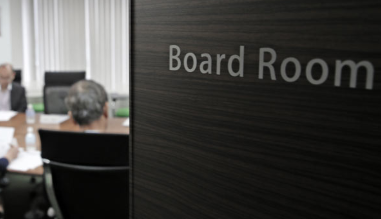The legality of executive sessions under review

An executive session taking place
February 26, 2020
The School Committee has been holding executive sessions regarding Superintendent Bill Olsen’s contract, sparking major controversy. There has been an uproar to remove the six committee members who voted against Olsen, as the conversation regarding his contract renewal was not public. Generally, the legality of such sessions has been in question.
Executive sessions are closed discussions by a certain board or committee, where matters are discussed in private, rather than in an open forum with the presence of the public.
A public body can hold an executive session if the majority of members in the body have voted to go into a closed sessions, their votes are recorded by poll, and records of the sessions are maintained.
According to the Commonwealth of Massachusetts, executive sessions can only be held, in context to Olsen’s contract, to “discuss only the physical and mental condition of a character and their reputation,” not their competence. They can also involve the dismissal of an individual, including complaints brought up against them. However, the particular individual being discussed has to be notified of the such topic at least 48 hours before the session.
Additionally, the individual has the right to be present at the session, speak on their behalf, and have counsel or a representative if they wish to do so.
A closed session can also consider or interview people for employment or appointment if the chair thinks that an open meeting cannot effectively gain qualified applicants. However, this such clause cannot apply to any meeting to consider or interview applicants who have already passed a prior preliminary screening.
A public body may discuss collective bargaining and litigation under executive session, if the discussion of these topics in an open meeting may have ” a detrimental effect on the government’s bargaining or litigating position,” as well as “to conduct strategy sessions in preparation for negotiations with non-union personnel [and] to actually conduct collective bargaining and contract negotiations with non-union personnel,” according to Kopelman and Paige, P.C.
Olsen is considered non-union personnel, and an employee of the School Committee.
As stated by the office of the Attorney General, if people have officially complained about a public body’s executive sessions, the body has to request mediation with their response to the complaint. If the mediation doesn’t create an agreement, the public body will have to respond to the complaint within ten business days along with the mediator.
If the Attorney General determines after investigation that the open meeting law has been violated, they can resolve the investigation both with or without a hearing, and can take either informal action, or formal order.
Informal action is analogous to a warning ticket. The Attorney General resolves the investigation with a letter the explains the violation of the public body and clarifies their obligations to the law.
The consequences of formal order are more severe. Ramifications include, but are not limited to, attendance at a training session authorized by the Attorney General, nullification of any action taken at the relevant meeting, in whole or in part, records of the meeting be made public, or an employee be reinstated without loss of compensation, seniority, and tenure. The members of the public body may be fined up to $1000, if a hearing took place.
In 2016, several Westford residents filed a complaint in the Middlesex Superior Court against the Board of Selectmen and the Planning Board, stating that the board violated the open meeting law with executive sessions regarding the asphalt plant. The boards allegedly discussed mediation improperly in executive session, and failed to notify the public that mediation was being discussed.
Upon review of the Board of Selectmen and Planning Board’s closed sessions, the Attorney General determined the boards did not violate law, and denied the preliminary injunction request by the residents who filed the action. The open meeting law ultimately didn’t require posting of the mediation sessions, as they weren’t attended by a quorum.
If the current situation at hand is brought to an Attorney General, given the complaint is filed at least 30 days after the alleged violation, the public body that the complaint was filed against must “meet to review the complaint’s allegations, take remedial action, if appropriate, and send to the complainant a response and a description of any remedial action taken,” as well as provide the Attorney General with “a copy of the complaint, the response, and a description of any remedial action taken.”








M. Y. • Feb 28, 2020 at 3:40 pm
I respectfully disagree that Mr. Olsen is “your employee.” He is an employee of the town, and you (the school committee) are in charge of his contract.
Westford Resident • Feb 26, 2020 at 8:52 pm
Regardless, I believe the Superintendent should have been notified of the executive sessions taking place, so he can have proper representation where a vote was taken.
Avery Adam • Feb 26, 2020 at 5:07 pm
Thank you but I think you have overlooked reason #3. To discuss strategy with respect to collective bargaining or litigation if an
open meeting may have a detrimental effect on the government’s bargaining or litigating position. Also, to conduct strategy sessions in preparation for negotiations with non-union personnel; to actually conduct collective bargaining and contract negotiations with non-union personnel. http://www.k-plaw.com/pdf/Executive-Session.pdf
Superintendent is non-union personnel and the School Committee’s only employee.
Keertana Gangireddy • Feb 26, 2020 at 6:28 pm
Thank you for your feedback; the article now has updates regarding reason #3 from the link provided.